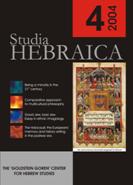Spanish Jewry – from Persecutions to Expulsion (1391–1492)
Spanish Jewry – from Persecutions to Expulsion (1391–1492)
Author(s): Yom Tov Assis Subject(s): Jewish studies
Published by: The Goldstein Goren Center for Hebrew Studies
Keywords: Iberian Jewry before 1391; The Massacres of 1391; The Aftermath of the Massacres; The Converso Problem; The Tortosa Disputation and its Consequences; Jewish Reactions; The Anti-Converso Campaign; The Catholic Monarchs; The Inquisition; The Jewish Question
Summary/Abstract: The 1391 massacres marked a turning-point in the history of Spanish Jewry. The Jews in the Hispanic kingdoms of Christian Spain had enjoyed a privileged position during the Reconquista. Until the fourteenth century, they played an important role in the life of the country and attained a place of prominence in the Jewish world. The Jewish population of the Hispanic kingdoms was the largest in Europe and its political, cultural and economic integration was the most extensive in medieval Christian Europe. This integration increased the intensity of the anti-Jewish hostilities. Until the fourteenth century the Jews could depend on the king’s protection. Mutual interests brought kings and Jews closer. An unwritten alliance for the mutual benefit of the two sides turned the Iberian peninsula into the safest and most attractive haven for the Jews
Journal: Studia Hebraica
- Issue Year: 2004
- Issue No: 4
- Page Range: 307-319
- Page Count: 13
- Language: English
- Content File-PDF

